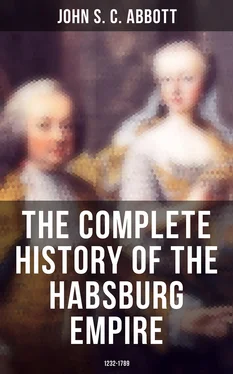The emperor now devoted his energies to the consolidation of these Austrian provinces. They were four in number, Austria, Styria, Carinthia and Carniola. All united, they made but a feeble kingdom, for they did not equal, in extent of territory, several of the States of the American Union. Each of these provinces had its independent government, and its local laws and customs. They were held together by the simple bond of an arbitrary monarch, who claimed, and exercised as he could, supreme control over them all. Under his wise and energetic administration, the affairs of the wide-spread empire were prosperous, and his own Austria advanced rapidly in order, civilization and power. The numerous nobles, turbulent, unprincipled and essentially robbers, had been in the habit of issuing from their castles at the head of banditti bands, and ravaging the country with incessant incursions. It required great boldness in Rhodolph to brave the wrath of these united nobles. He did it fearlessly, issuing the decree that there should be no fortresses in his States which were not necessary for the public defense. The whole country was spotted with castles, apparently impregnable in all the strength of stone and iron, the secure refuge of high-born nobles. In one year seventy of these turreted bulwarks of oppression were torn down; and twenty-nine of the highest nobles, who had ventured upon insurrection, were put to death. An earnest petition was presented to him in behalf of the condemned insurgents.
"Do not," said the king, "interfere in favor of robbers; they are not nobles, but accursed robbers, who oppress the poor, and break the public peace. True nobility is faithful and just, offends no one, and commits no injury."
CHAPTER II.
REIGNS OF ALBERT I, FREDERIC, ALBERT AND OTHO.
From 1291 to 1347.
Table of Contents
Anecdotes Of Rhodolph.—His Desire For The Election Of His Son.—His Death.—Albert.—His Unpopularity.—Conspiracy Of The Nobles.—Their Defeat.—Adolphus Of Nassau Chosen Emperor.—Albert's Conspiracy.—Deposition Of Adolphus And Election Of Albert.—Death Of Adolphus.—The Pope Defied.—Annexation Of Bohemia.—Assassination Of Albert.—Avenging Fury.—The Hermit's Direction.—Frederic The Handsome.—Election Of Henry, Count Of Luxemburg.—His Death.—Election Of Louis Of Bavaria.—Capture Of Frederic.—Remarkable Confidence Toward a Prisoner.—Death Of Frederic.—An Early Engagement.—Death Of Louis.—Accession Of Albert.
Rhodolph of Hapsburg was one of the most remarkable men of his own or of any age, and many anecdotes illustrative of his character, and of the rude times in which he lived, have been transmitted to us. The Thuringian knight who speared the emperor's horse in the bloody fight of Murchfield, was rescued by Rhodolph from those who would cut him down.
"I have witnessed," said the emperor, "his intrepidity, and never could forgive myself if so courageous a knight should be put to death."
During the war with Ottocar, on one occasion the army were nearly perishing of thirst. A flagon of water was brought to him. He declined it, saying,
"I can not drink alone, nor can I divide so small a quantity among all. I do not thirst for myself, but for the whole army."
By earnest endeavor he obtained the perfect control of his passions, naturally very violent. "I have often," said he, "repented of being passionate, but never of being mild and humane."
One of his captains expressed dissatisfaction at a rich gift the emperor made to a literary man who presented him a manuscript describing the wars of the Romans.
"My good friend," Rhodolph replied, "be contented that men of learning praise our actions, and thereby inspire us with additional courage in war. I wish I could employ more time in reading, and could expend some of that money on learned men which I must throw away on so many illiterate knights."
One cold morning at Metz, in the year 1288, he walked out dressed as usual in the plainest garb. He strolled into a baker's shop, as if to warm himself. The baker's termagant wife said to him, all unconscious who he was,
"Soldiers have no business to come into poor women's houses."
"True," the emperor replied, "but do not be angry, my good woman; I am an old soldier who have spent all my fortune in the service of that rascal Rhodolph, and he suffers me to want, notwithstanding all his fine promises."
"Good enough for you," said the woman; "a man who will serve such a fellow, who is laying waste the whole earth, deserves nothing better."
She then, in her spite, threw a pail of water on the fire, which, filling the room with smoke and ashes, drove the emperor into the street.
Rhodolph, having returned to his lodgings, sent a rich present to the old woman, from the emperor who had warmed himself at her fire that morning, and at the dinner-table told the story with great glee to his companions. The woman, terrified, hastened to the emperor to implore mercy. He ordered her to be admitted to the dining-room, and promised to forgive her if she would repeat to the company all her abusive epithets, not omitting one. She did it faithfully, to the infinite merriment of the festive group.
So far as we can now judge, and making due allowance for the darkness of the age in which he lived, Rhodolph appears to have been, in the latter part of his life, a sincere, if not an enlightened Christian. He was devout in prayer, and punctual in attending the services of the Church. The humble and faithful ministers of religion he esteemed and protected, while he was ever ready to chastise the insolence of those haughty prelates who disgraced their religious professions by arrogance and splendor.
At last the infirmities of age pressed heavily upon him. When seventy-three years old, knowing that he could not have much longer to live, he assembled the congress of electors at Frankfort, and urged them to choose his then only surviving son Albert as his successor on the imperial throne. The diet, however, refused to choose a successor until after the death of the emperor. Rhodolph was bitterly disappointed, for he understood this postponement as a positive refusal to gratify him in this respect. Saddened in spirit, and feeble in body, he undertook a journey, by slow stages, to his hereditary dominions in Switzerland. He then returned to Austria, where he died on the 15th of July, 1291, in the seventy-third year of his age.
Albert, who resided at Vienna, succeeded his father in authority over the Austrian and Swiss provinces. But he was a man stern, unconciliating and domineering. The nobles hated him, and hoped to drive him back to the Swiss cantons from which his father had come. One great occasion of discontent was, that he employed about his person, and in important posts, Swiss instead of Austrian nobles. They demanded the dismission of these foreign favorites, which so exasperated Albert that he clung to them still more tenaciously and exclusively.
The nobles now organized a very formidable conspiracy, and offered to neighboring powers, as bribes for their aid, portions of Austria. Austria proper was divided by the river Ens into two parts called Upper and Lower Austria. Lower Austria was offered to Bohemia; Styria to the Duke of Bavaria; Upper Austria to the Archbishop of Saltzburg; Carniola to the Counts of Guntz; and thus all the provinces were portioned out to the conquerors. At the same time the citizens of Vienna, provoked by the haughtiness of Albert, rose in insurrection. With the energy which characterized his father, Albert met these emergencies. Summoning immediately an army from Switzerland, he shut up all the avenues to the city, which was not in the slightest degree prepared for a siege, and speedily starved the inhabitants into submission. Punishing severely the insurgents, he strengthened his post at Vienna, and confirmed his power. Then, marching rapidly upon the nobles, before they had time to receive that foreign aid which had been secretly promised them, and securing all the important fortresses, which were now not many in number, he so overawed them, and so vigilantly watched every movement, that there was no opportunity to rise and combine. The Styrian nobles, being remote, made an effort at insurrection. Albert, though it was in the depth of winter, plowed through the snows of the mountains, and plunging unexpectedly among them, routed them with great slaughter.
Читать дальше












